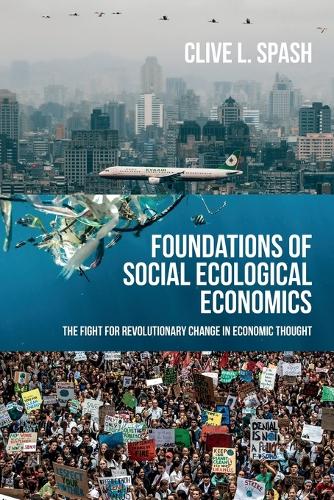
Foundations of Social Ecological Economics: The Fight for Revolutionary Change in Economic Thought
(Paperback)
Available Formats
Publishing Details
Foundations of Social Ecological Economics: The Fight for Revolutionary Change in Economic Thought
By (Author) Clive L Spash
Manchester University Press
Manchester University Press
10th September 2025
United Kingdom
Classifications
Tertiary Education
Non Fiction
338.927
Physical Properties
Paperback
272
Width 156mm, Height 234mm, Spine 15mm
387g
Description
Social ecological economics is an emerging paradigm that combines critical social science with realism to offer a radical theoretically grounded alternative economics based on ethical social provisioning to meeting needs.
The foundations of the approach include its radical roots, philosophical presuppositions and preanalytic vision. Both mainstream and heterodox economics - Marxism, feminism, institutionalism, Post Keynesianism - are critically reviewed highlighting the lack of attention to the combined social and environmental crises. The potentiality and means for integration of knowledge across heterodox thought is explored and explicitly addressed. The author tackles the failures of the mainstream economic orthodoxy and its dissenting apologists.
The book justifies radical structural change, how this can be achieved and where this takes us in terms of establishing an alternative to capitalist focussed economics for sustaining and developing alternative social-ecological economies.
Reviews
"The field of ecological economics was founded in 1990. Clive Spash was active in it from the beginning with a decisive role over many years in the European Society of Ecological Economics. This book, written in crystal-clear style, develops the most profound philosophical discussion ever held of ecological economics as a branch of human ecology combining the study of social metabolism with valuation issues. Ecological economics is seen as the science of the institutions that secure the social provisioning of human needs while guiding a safe co-evolution of humans in nature. A landmark book building on the tradition of Otto Neurath and K.W. Kapp".
Joan Martinez-Alier, Professor of Economics and Economic History, Autonomous University of Barcelona
A brilliant contribution to, and about, a radical paradigm of social ecological economics concerned with both disciplinary and social-ecological transformation as necessary conditions for achieving a world in which we all, and all other species, can flourish.
Tony Lawson, Professor of economics and philosophy in the Faculty of Economics at the University of Cambridge
Clive Spash formulates in an unusual clear and consistent way a foundation for social ecological economics. He has for more than 30 years been engaged in developing ecological economics to ensure that its rationale the economys fundamental dependence on the bio-physical and the social is consistently treated. The book develops a clear distinction between mainstream and ecological economics, specifies the limitations of the former and clarifies what is gained by moving away from an anything goes ecological economics. The book is deeply rooted in the theory of science, offering a very enlightening text about fundamental issues for science that too often are glossed over or misunderstood. I am sure the book will provoke reflection and debate as well as help the society reclaim its identity. I found it very helpful.
Arild Vatn, Professor of Environmental Sciences, Department of International Environment & Development Studies, Norwegian University of Life Sciences, s, Norway.
'I advise that you all read the book, not only to learn but also to engage in further developments of Clive Spashs vision.'
Environmental Values
'The book constitutes an unparalleled effort in outlining a consistent framework for social ecological economics, where sufficiency replaces hedonic excess and promotion of unlimited wants (p. 213). Spashs firm commitment to a scientific approach, without lapsing into factvalue or scienceideology dichotomies, is welcome. He exposes the unrealism of those who claim to be real economists (to distinguish themselves from social ecological economists) and challenges the sciencesceptical pluriversalist positions of incommensurable ontologies. Antirealism and antiscientific rhetoric are both misplaced and unnecessary because the bottom line is that survival depends on getting things approximately right as to how Nature works, which is what science seeks to understand (p. 209). Foundations of social ecological economics is a major contribution to this endeavour, providing the rallying cry in the fight for revolutionary change in economic thought: There are only alternatives (p. 219).'
Richard Brnthaler, Degrowth Journal
"A landmark achievement that undoubtedly offers solid ground for not only ecological economists but a much broader heterodox community to build an emancipatory science able to truly revolutionise economic thought."
Marco Vianna Franco, Ecological Economics 227
Author Bio
Clive L. Spash is Professor of Public Policy & Governance at Vienna University of Economics & Business
